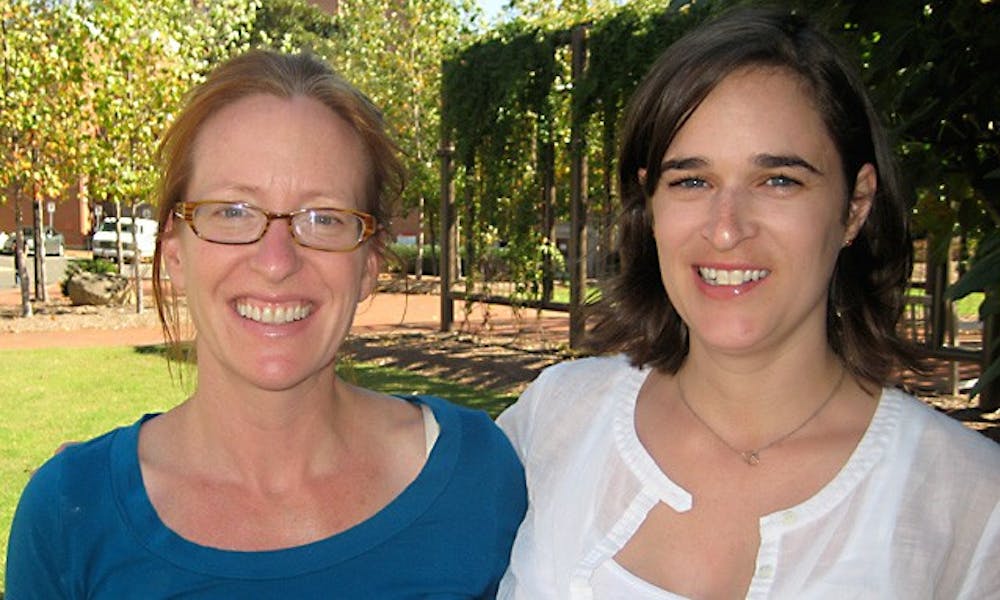Only Burger is about to have some competition from a new pork-based counterpart.
Tonight marks the launch of the mobile Sausage Wagon, which will serve handmade sausage specialties on-the-go in the Triangle area. The wagon is the first outlet for Farmhand Foods, a new company in the Triangle that will connect North Carolina farmers with local residents and restaurants.
“We know what a Triangle foodie wants to eat,” said Tina Prevatte, co-founder of Farmhand Foods. “[Farmhand Foods] takes all this energy for local healthy food in the Triangle and connects that with rural farmers and meat processors.”
The company will serve as the intermediary step in the meat production chain. Currently, independent farmers—not associated with any company or business—must take their animals to a slaughter facility, process individual cuts and market the cuts to businesses under their own name. Instead, Farmhand Foods will purchase pasture-raised whole animals, free of antibiotics or added hormones, from North Carolina farmers at a premium price. The company will then make the necessary arrangements to prepare the animals for sale—including processing, distribution and marketing.
Prior to Farmhand Foods, small-scale farmers would rarely have the means to sell their meat consistently year-round and utilize the animals in full. The company aims to provide the farmers’ fresh cuts to a larger market. Throughout the marketing process, the company will “co-brand” with each farmer to further promote their individual products.
Farmhand Foods sources meat from about 20 North Carolinian farm suppliers, including Parker Farm in Orange County, Triple B Farm in Granville County, Leigh Farm in Martin County and the NC Natural Hog Growers Association based in Duplin County.
“A lot of people probably want to buy more local food, but they don’t always know how or where,” said Mark Overbay, member of the advisory board for Farmhand Foods and president of Slow Food Triangle, which celebrates sustainable food and supports local farmers. “[Farmhand Foods] makes accessibility seem even less of a hurdle for the average consumer. It definitely fills a niche.”
The Sausage Wagon will serve as the initial outlet, and the company plans to expand its client base to local restaurants and retailers, Prevatte said.
“No one would know who we were or that we would be local; we would just be another product,” she said. “So we thought, let’s create a Sausage Wagon and get our name out there.”
Local chef Drew Brown, co-founder of Piedmont restaurant in downtown Durham, will create the wagon’s handcrafted sausages and other pork delicacies.
While the wagon will feature only pork products initially, Farmhand Foods will soon offer cuts of other meats, such as beef, in early 2011, Prevatte said.
The enterprise has its roots in North Carolina Choices, which is a Center for Environmental Farming Systems’ initiative. NC Choices aims to support independent farmers and develop a market for local, pasture-based poultry and meats.
Farmhand Foods co-founder Jennifer Curtis, who worked as the product manager for NC Choices for three years, said she collaborated with Prevatte to start Farmhand Foods because she recognized the need for a middleman company.
“It’s challenging to create a local meat supply chain,” Curtis said. “A lot of the retail buyers don’t have time to maintain relationships with multiple buyers.”
In addition to support from NC Choices and CEFS, financial backers include the North Carolina Rural Economic Development Center’s Economic Innovation Program, the North Carolina Tobacco Trust Fund and the W.K. Kellogg Foundation. Curtis and Prevatte officially launched Farmhand Foods as a business in January 2010.
Overbay said he believes Farmhand Foods will serve as an example for other budding food entrepreneurs who are interested in sustainable living.
“People are more interested in where their food comes from, and with good reason—the industrialized homogenous system of production is not sustainable,” Overbay said. “We need to create as many accessible ways as possible for people to get that [healthy, local] food.”
Get The Chronicle straight to your inbox
Signup for our weekly newsletter. Cancel at any time.

